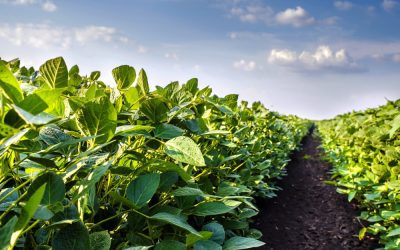Rulemaking for Clean Fuel Production Credit is underway for the U.S. Treasury and the IRS
By Blair Shipp, American Soybean Association

Indiana farmers are deep in the summer growing season, juggling fieldwork with critical advocacy efforts in both local and Washington, D.C. legislatures. As farmer-leaders prepare to fly to D.C. next week to discuss a range of soy priorities, the clock is ticking in this congress to pass meaningful legislation before the end of the year.
USDA Secretary Tom Vilsack announced June 26 a Request for Information (RFI) related to the Clean Fuel Production Credit to establish voluntary standards for biofuel feedstock crops grown using climate-smart farming practices. These standards aim to quantify, report and verify the greenhouse gas (GHG) emissions impacts, potentially influencing clean transportation fuel policies at international, national or state levels. This initiative seeks to create market opportunities for U.S. farmers while advancing environmental benefits.
The U.S. Treasury and Internal Revenue Service are starting the process of rulemaking to develop guidance related to the Clean Fuel Production Credit (45Z), which goes into effect Jan. 1, 2025. This credit will replace the existing Biodiesel Tax Credit (BTC or 40A) and Sustainable Aviation Fuel Tax Credit (40B) and will apply to biodiesel, renewable diesel and sustainable aviation fuel (SAF).
USDA is collecting information through this RFI to make a stronger case for more flexibility in climate-smart agriculture practices used to lower carbon intensity scores for the Clean Fuel Production Credit.
ASA supports climate-smart agriculture to enhance carbon intensity reductions but emphasizes the need for flexibility in sustainability practices across all soy-producing states. In April, ASA expressed appreciation for soy’s inclusion as a Sustainable Aviation Fuel feedstock under new Treasury guidance.
However, ASA has concerns that strict requirements, such as mandating both no till and cover cropping practices, could hinder participation, especially in northern states where these practices are less feasible due to climate constraints.
Farm bill update from Congress
The Senate Agriculture Committee advanced a farm bill framework proposed by Ranking Member Sen. John Boozman (R-Ark.) in response to Chairwoman Sen. Debbie Stabenow’s (D-Mich.) initiative.
The framework aims to strengthen the farm safety net by adjusting reference prices and expanding access to Agriculture Risk Coverage and Price Loss Coverage. It also proposes increased funding for trade promotion programs, supports biobased markets, and invests in agricultural research and biofuels for energy independence.
Negotiations with Chairwoman Stabenow and Democratic committee members are underway to finalize the bill. The House Agriculture Committee passed its version on May 24, beginning discussions in the full House. ASA continues to advocate for its priorities in the legislative process.
WRDA passes House
In late June, the House Transportation & Infrastructure (T&I) Committee approved the Water Resources Development Act of 2024, legislation that authorizes the U.S. Army Corps of Engineers’ Civil Works Program for projects to improve the nation’s ports, inland waterway navigation, flood and storm protection, and other aspects of our water resources infrastructure.
ASA’s primary advocacy focus this year is ensuring that inland waterways projects funded through the Infrastructure Investment and Jobs Act (IIJA) are completed using 100 percent general revenue rather than Inland Waterway Trust Fund (IWTF) dollars.
The IIJA allocated funds for seven inland waterways construction projects, but unforeseen expense overruns due to increased supply and transportation costs have left these projects underfunded. Without a specific provision in WRDA 2024 to waive the IWTF cost-share for these major rehabilitation projects, there is a significant risk of depleting the IWTF, which could delay critical ongoing capital improvement projects.
Unfortunately, the WRDA bill that passed the T&I Committee did not include any provisions for modernizing the inland waterways system, despite the support of more than 50 House members who submitted requests similar to that of ASA.
However, the Senate Environment & Public Works Committee passed its version of WRDA in May, which permanently adjusts the inland waterways cost-share for construction and major rehabilitation projects to 75 percent general revenues (up from 65 percent) and 25 percent (down from 35 percent) Inland Waterways Trust Fund. The Senate bill also ensures 100 percent full federal funding for projects outlined in the Infrastructure Investment and Jobs Act. Both of these provisions were top requests made by ASA.
The two WRDA bills will eventually be negotiated in conference between the House and Senate. ASA will continue its advocacy to ensure favorable outcomes for our inland waterways.
ASA wants dicamba registration system
ASA submitted comments to the EPA in June on Bayer CropScience’s proposed registration for a new dicamba product. This registration aims to renew the use of low-volatility dicamba on dicamba-tolerant soybeans and cotton.
While soy growers generally support the proposal, they have raised concerns about the lack of post-emergent access for soybean farmers, which is vital for managing herbicide-resistant weeds like palmer amaranth and for conservation efforts. ASA urged the EPA to ensure access to post-emergent dicamba use.
ASA also expressed concerns about the proposed June 12 cutoff for pre-emergent use on soybeans, emphasizing the need for a reasonable application cutoff date to maintain dicamba’s competitiveness as a weed control tool. Additionally, ASA urged the EPA to use the best available science to develop appropriate Endangered Species Act restrictions and to base restrictions on off-target incidences solely on available evidence.
Currently, there is no registration in place for dicamba use in 2025, despite seed producers preparing dicamba-tolerant seed for planting across millions of acres. ASA is urging the EPA to swiftly approve a new registration by September to avoid disruptions to input supply chains.
The EPA will review public comments, including ASA’s, as part of the proposed application process and incorporate feedback into the registration decision.
Posted: July 20, 2024
Category: Indiana Corn and Soybean Post - July 2024, ISA M&P, News




